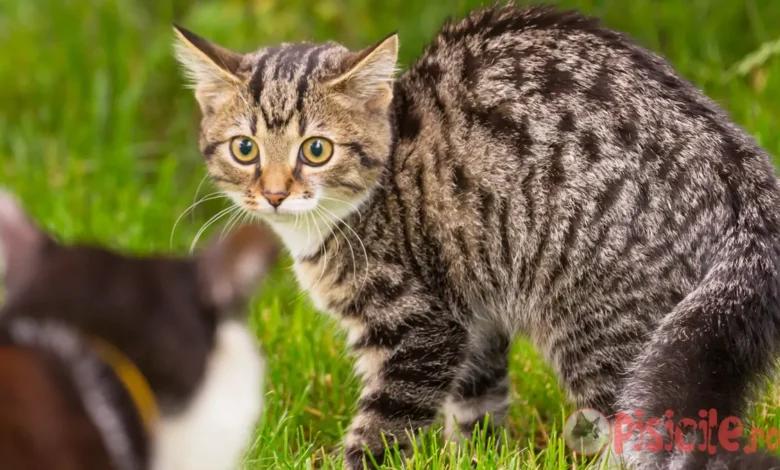
Anxiety in cats. How does it manifest itself and how can it be treated?
If you have a cat, you expect it to greet you with affection and be happy and receptive to your petting. However, these expectations are often not met, as the cat avoids contact or exhibits aggressive behavior when you try to touch, pet or hold it. Anxiety in cats is a common problem, affecting their behavior and general health.
Subject
What is anxiety in cats?
As in humans, anxiety in cats is a state of ongoing unease or fear, often triggered by changes in the living environment, traumatic experiences or health conditions. Even though most anxious cats develop these behaviors from the first year of life, there are also cases where anxiety appears later, depending on the events they go through or possible physical ailments.
Common causes of anxiety in cats
As we all know, cats are highly typical animals, loving their routine and habits. Any change can create a state of restlessness and anxiety. Here are some possible reasons why a cat may suffer from anxiety:
1. Dirty litter. A litter box that is dirty or placed in an inappropriate place can induce a state of discomfort for the cat. If sharing the litter box with other cats causes her to avoid using it, anxiety can escalate and it is necessary to supplement the number of litter boxes and clean them frequently.
2. Changes in family life. The death of a family member, the arrival of a new animal or a baby, or even the prolonged absence of the owners can generate feelings of abandonment and insecurity. These changes very commonly cause anxiety in cats.
3. Over-stimulation through play. Excessive or forced play, especially in the presence of small children, can overwhelm the cat. It is not recommended to forcefully play with the cat if it is not interested. She may have aggressive reactions or prefer to stay hidden.
4. Age and health problems. Older cats or those with medical conditions become more sensitive and may develop pain-related anxiety.
5. Traumatic experiences and poor socialization. Cats that have not been exposed to various environments while growing up can develop fears of unfamiliar stimuli. For example, a cat that has been traumatized by another cat while growing up may develop anxiety throughout its life.
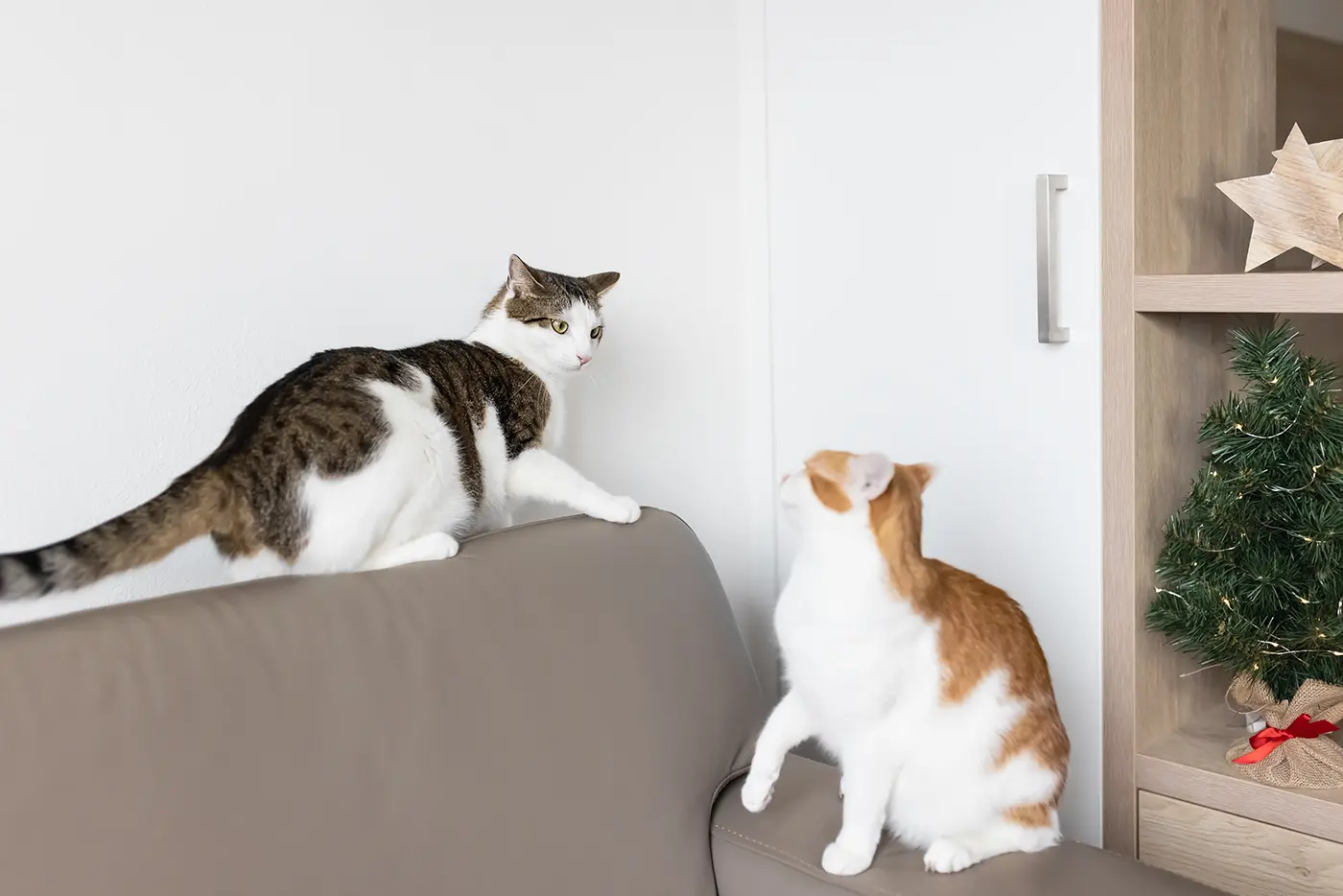
6. Insufficient food. If the cat is not fed enough or if there is a competition for food with another cat, anxiety can occur very easily.
How do you know if a cat is suffering from anxiety?
The manifestation of anxiety does not have an established pattern, it manifests itself differently depending on the cat. Anxiety can manifest differently depending on the cat. To tell if your cat is suffering from anxiety, watch for symptoms:
- The cat defecates outside the litter box, although it normally wouldn't.
- The cat meows excessively and becomes very clingy or very aggressive. These extremes of behavior may be due to anxiety.
- The cat licks excessively, to the point of losing the fur in certain areas or even injuring the skin.
See also: Alopecia or cat baldness on the belly and other parts of the body
- Vomiting, diarrhea or difficulty urinating are common symptoms when anxiety occurs in cats.
- If your cat is always looking for hidden places and does not want to socialize with family members or other cats in the household, it is most likely anxious.
5 Ways to Prevent and Treat Anxiety in Cats?
In order for a cat not to suffer from anxiety, it is necessary that it always feels safe. Providing a stable, quiet environment and paying attention to her needs may prevent anxiety.
Here are some helpful tips to prevent or treat anxiety in cats:
1. If you move or bring a new cat home, initially limit her access to one room where she has access to litter, water and food. As he gets used to it, gradually expand his access to the rest of the house. Keeping her toys, favorite blanket, and other objects with familiar smells can reduce stress. Adaptation to the new environment must be done gradually.
2. If you are going on vacation, make sure he has enough toys, preferably with catnip, and a large water container, such as electric fountains, that keep the water fresh. You can also leave a t-shirt or blouse that you wore before you left.
Read also: How Long You Can Leave Your Cat Alone at Home and What to Consider
3. Calming supplements can be a solution for reducing anxiety in cats. Talk to your vet about natural, herbal supplements like chamomile or valerian that can help relax your cat.
4. Pheromone diffusers can induce a calm state in the cat and reduce or prevent anxiety. However, avoid scented sticks or scented devices, as cats can be sensitive or even allergic to these scents. The most recommended are the plug-in devices, which gradually eliminate pheromones. These are also effective in calming conflicts between cats.
Read also: Conflicts between cats in the house. Causes and how they can be prevented.
5. A balanced feed and an automatic feeding device (dispenser) can reduce stress. They distract her from stressful situations and help her relax.
In addition, during the winter holidays it is very important to protect the cat from the sound of fireworks and firecrackers, especially on New Year's Eve.
This article is helpful: How to protect the cat from the bangs of firecrackers and fireworks on New Year's Eve.
In conclusion, cat anxiety is a common challenge, and to help them feel comfortable, owners need to be aware of their cat's stressors and emotional needs. Managing anxiety in cats requires patience and gentleness. By providing your cat with a stable and peaceful environment, we can help it lead a more peaceful and happy life.
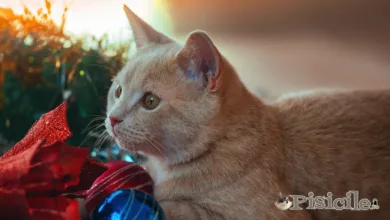
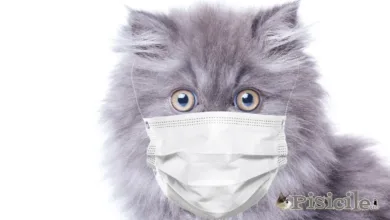
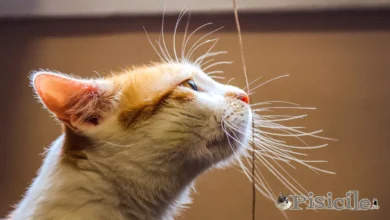

good brown cats